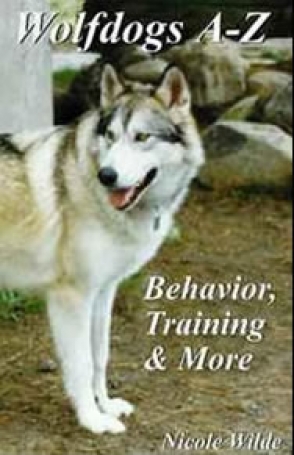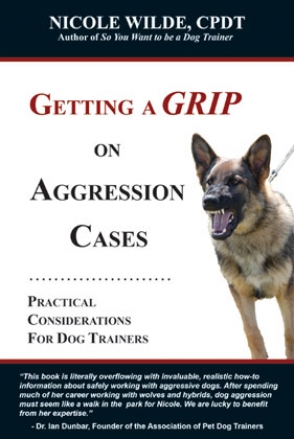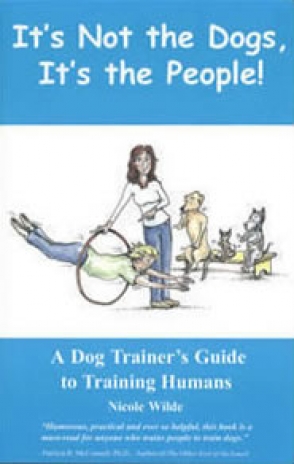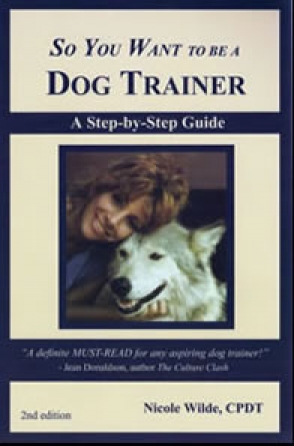Nicole Wilde has worked with wolfdog (aka wolf hybrid) rescue, education and training for over fifteen years.
Can't We (Trainers) All Just Get Along?
“Cookie-slinging weenies!”
“Punishment trainers!”
“Posi-Nazis!”
“Jerk trainers!”
Know what these epithets have in common? For one thing, they’ve all been slung around the internet with the intention of disparaging other trainers. They also all show the ignorance of the person spewing them.
In a way, the training landscape is a lot like the political one. There are those who are far to the right and those to the far left, with the majority of folks falling somewhere in between. At one extreme end of the training spectrum there are those who use punishments like helicoptering and hanging—abuse, not training, to any ethical trainer’s mind. There are also trainers closer to this end of the spectrum who teach new behaviors by letting dogs make mistakes, then reprimanding by jerking them roughly (or some by shocking with e-collars). Far at the other end, there are trainers who use treats to train new behaviors but have no concept of how to fade those treats out, so that dogs are forever dependent on food to perform—in other words, treats are used as bribes. There are also trainers closer to this end who would have no idea what to do if, for example, an aggressive dog wasn’t responding to treats. Never mind that both of these extremes do not represent the majority of trainers; in this swamp of murky understanding, misconceptions breed.
So if not extremists, what type of trainers form the middle ground? Some consider themselves “balanced” in that rewards are used, as well as what the trainer would consider fair corrections if needed. Others call themselves “positive trainers,” which is generally used to indicate those who train with treats and primarily use positive reinforcement. I’ve seen a wide range of techniques and skill levels from both camps. I’ve also seen alarming levels of intolerance toward trainers who are different, from both sides. I have observed online people being vilified for the way others assume they train, without anyone ever having even had an actual conversation with the person, never mind seeing them work with a dog.
Regardless of where we fall on the spectrum, the vast majority of us truly care about dogs. If you believe your methods are the right way to achieve better-trained, happy fur-kids, but all you offer is hostility to those who believe otherwise, you’ll never change anyone’s mind. If you engage in a respectful dialogue, though, you never know—you both might come away with a better understanding of how “the other side” thinks and feels, and one or both of you might even learn something. It might shock you (no pun intended) to learn that I am friends with people who use pinch collars and even (albeit very infrequently) e-collars. Are these tools my personal choice? No. Does it mean that because the person uses them that he or she is a terrible person? Of course not. It’s a given that we all feel most comfortable with those who are like us. But in my opinion it takes a bigger person to have a respectful dialogue with someone who is different than to hang around only with those like him or herself, patting each other on the back and talking trash behind the backs of others.
I’ve noticed that rude, condescending comments about “those other trainers” abound online, where confrontation is limited to a screen that doesn’t talk back. I’d bet you a bagful of dog biscuits most people who post those comments wouldn’t dare make them to the person’s face. And we’ve all seen those same people posting over and over on blog sites that are obviously dedicated to a specific style of training, whether it be mostly positive or more balanced, slamming the author of the blog, or taking text out of context in order to start an argument. Why is it so hard to have a simple conversation?
Dog training is not a licensed profession, and no one knows what the future may hold. We want the public to perceive trainers in a professional light, yet many times trainers themselves show a real lack of professionalism when they speak badly of other trainers to clients and colleagues. The world has enough negativity without those who are in a profession based on a love of animals contributing more. Can’t we all just get along?










